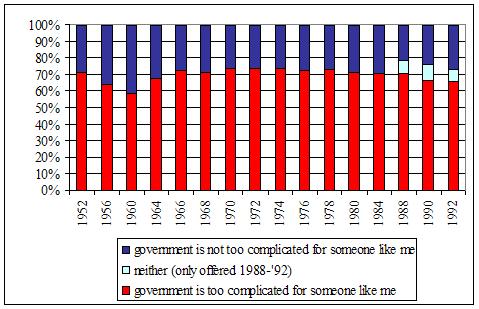« a map of civic renewal | Main | "community as text" »
January 12, 2005
is policy just too complicated?
Some people think that it's harder for citizens to participate in politics today than it was 50 years ago, because issues have simply grown more complex. The G.I. bill was relatively simple legislation, so it was easy to organize members of veterans' groups and others to support it. But health care reform in the 21st century is enormously complex. No one really knows what should be done. Some people argue that public engagement has declined as a result.

By the way, people's impression of complexity is not the only thing that might affect their participation. Regardless of their subjective beliefs, the actual complexity of policy issues might block their engagement. And perhaps we should be a little disappointed that people haven't gained confidence in their understanding of politics. Before World War II, the mean level of educational attainment of the US population was elementary school; by 2000, it was two years of college. Yet we feel no more capable of understanding policy--perhaps somewhat less.
January 12, 2005 2:58 PM | category: none
Comments
"Yet we feel no more capable of understanding policy--perhaps somewhat less."
might this be due at least in part to the conventions of the industry whose role it is to inform us?
"he said - she said - hell if we know" doesn't make for clarity.
January 12, 2005 3:20 PM | Comments (2) | posted by Anna
The following is sheer speculation, but it occurs to me that perhaps increased educational attainment is pushing levels of confidence up, while increased complexity and lousy reporting are pushing confidence down. The result would be no change over time.
January 13, 2005 9:06 PM | Comments (2) | posted by Peter Levine